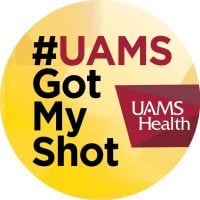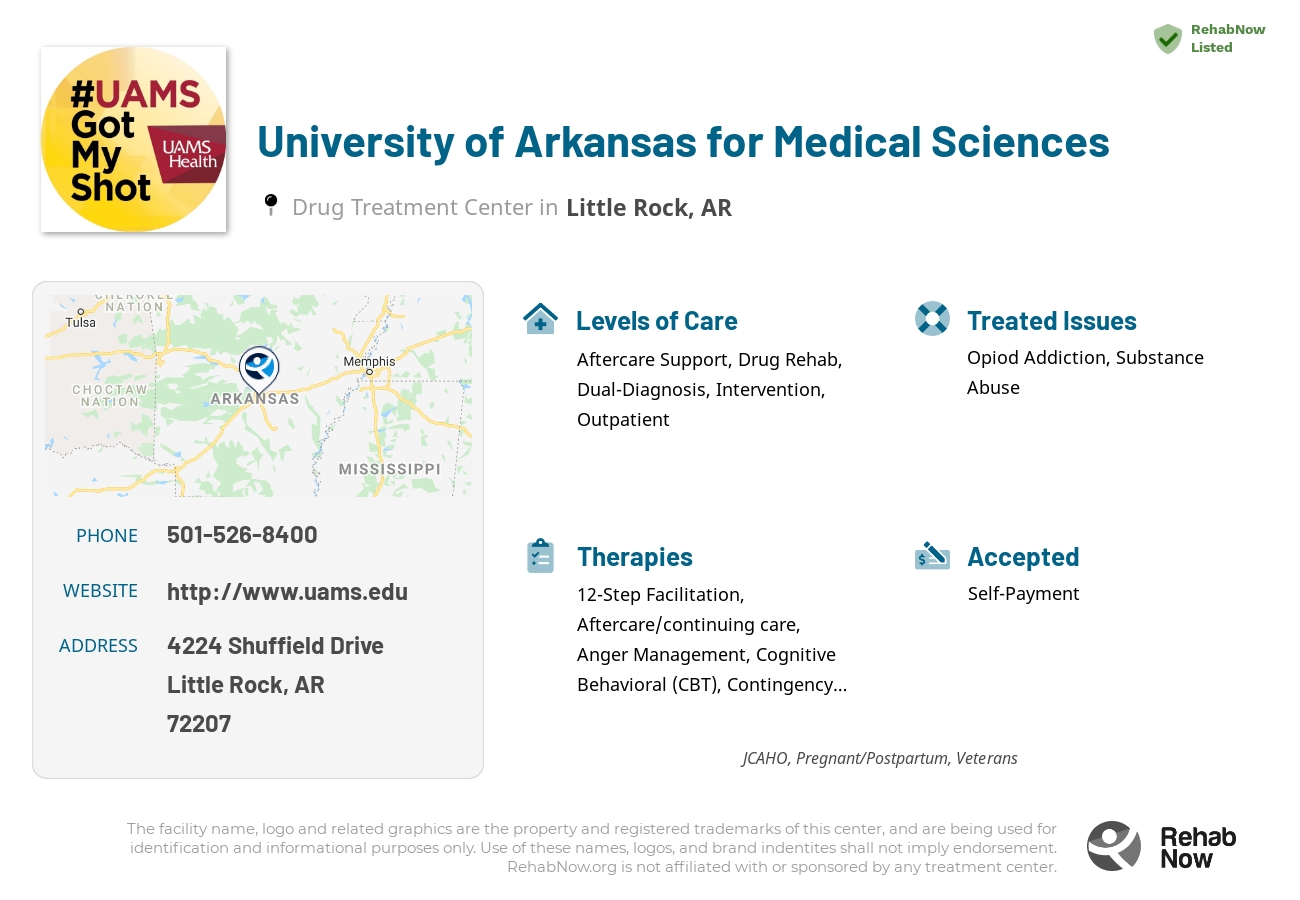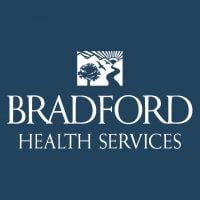University of Arkansas for Medical Sciences
Drug Rehab Center in Little Rock, Arkansas
UAMS is an addiction treatment facility in Little Rock, AR, providing personalized and comprehensive drug rehab services, including detox, outpatient treatment, aftercare support, and dual-diagnosis treatment, to individuals seeking recovery from addiction, with a commitment to high-quality care.
About This Arkansas Facility
University of Arkansas for Medical Sciences is a leading addiction and substance abuse treatment facility located in Little Rock, Arkansas. Accredited by JCAHO and SAMHSA, this facility offers a comprehensive range of services for individuals struggling with opioid addiction, substance abuse, dual diagnosis, and drug addiction. They provide personalized treatment plans to address each individual's unique needs and challenges, ensuring the best possible care and support. The facility offers various levels of care including detox, outpatient programs, intervention services, drug rehab, and dual diagnosis treatment. They also provide aftercare support to help individuals maintain their sobriety and successfully transition back into their daily lives.
At University of Arkansas for Medical Sciences, individuals can access a wide range of services to address their addiction and substance abuse issues. The facility offers a detox program to safely and comfortably manage the withdrawal process. They provide outpatient treatment programs that allow individuals to receive the necessary care while still maintaining their daily routines. Additionally, University of Arkansas for Medical Sciences specializes in dual diagnosis treatment, addressing both addiction and underlying mental health issues. They also offer intervention services to help families and loved ones effectively communicate their concerns and encourage individuals to seek treatment. With a focus on personalized care and comprehensive support, University of Arkansas for Medical Sciences is dedicated to helping individuals overcome addiction and achieve lasting recovery.
Genders
Ages
Modality
Additional
Accreditations
SAMHSA

JCAHO
Conditions and Issues Treated
Using both legal medications and illegal substances in order to maintain an addiction is substance abuse. If you are taking more of your prescription, or earlier than the prescribed time interval between doses than is directed you may be abusing that medication. If you are obtaining legal medications illegally in or near Little Rock, AR, you may be suffering from substance abuse.
Illegal substances can become addictive after a single use and lead rapidly to substance abuse. The professionals at University of Arkansas for Medical Sciences are here to help.
Opioids are a set of drugs prescribed for pain relief. Health care providers prescribe opioids for relief of severe pain after major surgeries and in conditions like cancer. Oxycodone, fentanyl, oxymorphone, hydrocodone, codeine, and morphine are some of the commonly prescribed opioids. They also include illegal drugs of abuse like heroin. Opioid addiction refers to the compulsive seeking of opioids, even when they are not required medically.
Opioid addiction treatment involves medication-assisted therapy (MAT) in which medicines, counseling, and behavioral therapies are all employed. Opioid addiction treatment is a comprehensive approach at University of Arkansas for Medical Sciences in Little Rock, AR that boosts the treatment success rate and provides sustained recovery.
Mental illness includes conditions such as anxiety, depression, schizophrenia, bipolar disorder. It can also happen that mental illness causes drug addiction and vice versa. University of Arkansas for Medical Sciences in Arkansas knows it is vital to diagnose dual diagnosis or co-occurring disorder.
Levels of Care Offered at University of Arkansas for Medical Sciences
This center offers a variety of custom treatment tailored to individual recovery. Currently available are Aftercare Support, Detox, Drug Rehab, Dual-Diagnosis, Intervention, Outpatient, with additional therapies available as listed below.
Detoxification is a process that allows the patient to stop using opioids without experiencing severe withdrawal symptoms. This can be necessary for those who have been addicted for a long period of time or who are struggling with chronic pain.
During this process, addicts will receive medication and psychological support from doctors and other medical professionals until they can control their cravings.
Facilities like University of Arkansas for Medical Sciences offer a variety of services, such as individual and group counseling and family therapy. During the sessions, you work with a team of experts that include: General physicians, Psychiatrists, Social Workers, and Psychologists. The main goals of outpatient recovery programs are to help addicted individuals reduce drug use and addictive behaviors, eventually becoming entirely sober.
An intervention is a meeting held by families and friends of the addicted party, managed by University of Arkansas for Medical Sciences. It lets the person know that their loved ones are concerned about them. It is intended to make the addicted party agree to get help.
Interventions are often hosted by a mental health professional in Arkansas who knows how to communicate with people dealing with addiction. These intervention services can make all the difference when it comes to getting loved ones to agree to treatment.Treatment is just a first step in sustaining sobriety. After rehabilitation, counseling for aftercare helps the person adapt to a life without drugs. A sober living facility in Little Rock, job therapy, or educational assistance may be included in this service, managed by University of Arkansas for Medical Sciences. This is when a preventive strategy for relapse starts to take shape.
Therapies & Programs
One of the most common areas of stress and damage during addiction is in intimate relationships. Addiction involves everyone in a family, not only the addict. Couples therapy can rebuild trust and joy that may have been damaged.
When the whole family is involved, healing can be far more successful. Family counseling involves genetic factors to the family of the addict. This offers the means to cope with addiction and its underlying emotional disorders for loved ones. It is a helpful method for addicts in helping to adjust to sober living.
Trauma therapy allows people who struggled with a past trauma to face the situation and learn to overcome the situation. Many people who went through trauma early on, struggle with addiction later in life. By addressing the trauma and moving past the issues, it can help someone attending treatment at University of Arkansas for Medical Sciences in Little Rock, AR move forward with their recovery and begin to take a better hold of their sober future.
Contingency management is a way to help motivate someone to remain substance free. It is a process University of Arkansas for Medical Sciences uses which involves rewarding positive choices and good outcomes. As humans we are wired to recreate experiences that lead to positive feelings.
Payment Options Accepted
For specific insurance or payment methods please contact us.
Additional Details
Specifics, location, and helpful extra information.
Little Rock, Arkansas 72207 Phone Number(501) 526-8400 Meta DetailsUpdated November 25, 2023
Staff Verified
What else do people call University of Arkansas for Medical Sciences?
People have occasionally also searched for “University of Arkansas for Medical Sciences/SAT Clinic in Arkansas”
Patient Reviews
There are no reviews yet. Be the first one to write one.
Little Rock, Arkansas Addiction Information
Arkansas has one of the highest rates of substance abuse and addiction in the nation for drug overdoses. Methamphetamines and prescription opioids are by far the most widely abused drugs in the state. Despite the high rates, Arkansas ranked only 25th in the for drug overdose deaths in 2013.
In Little Rock, Arkansas, there are approximately 1,000 people who are admitted to treatment centers for addiction to drugs or alcohol every year. There were 2,721 admissions to publicly funded alcohol and drug treatment programs in Little Rock in 2016. The most commonly reported drugs of abuse were methamphetamine (42%), heroin (26%), and alcohol (22%). Some popular treatment options include inpatient rehab, outpatient rehab, and detox centers.
Treatment in Nearby Cities
- Benton, AR (19.7 mi.)
- Fordyce, AR (64.8 mi.)
- Harrison, AR (111.6 mi.)
- Booneville, AR (94.7 mi.)
- Salem, AR (115.7 mi.)
Centers near University of Arkansas for Medical Sciences
The facility name, logo and brand are the property and registered trademarks of University of Arkansas for Medical Sciences, and are being used for identification and informational purposes only. Use of these names, logos and brands shall not imply endorsement. RehabNow.org is not affiliated with or sponsored by University of Arkansas for Medical Sciences.












